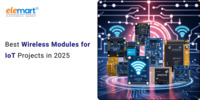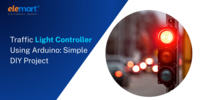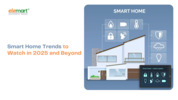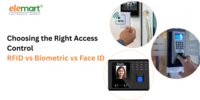- Jun 20, 2025
Share this post on:

Cities around the world are facing unprecedented challenges. Rapid urbanization, increasing traffic congestion, air pollution, and limited resources are pushing urban areas to their breaking points. The vision of a "smart city" – one that leverages technology to improve quality of life, efficiency, and sustainability – is gaining traction as a potential solution. While initiatives like smart grids, connected infrastructure, and data-driven governance often take center stage, a critical, often overlooked, component is smart parking technology. Far from being just about finding an empty space, smart parking is a foundational element in building truly intelligent and livable urban environments.
The Parking Problem: A City-Wide Headache
Before we dive into the solutions, let's acknowledge the scale of the problem. Traditional parking management is a chaotic and frustrating experience for everyone. Drivers waste valuable time and fuel circling blocks in search of a spot, contributing to congestion and pollution. Cities lose out on potential revenue and face increased pressure on infrastructure. Here’s a snapshot of the issues:
- Traffic Congestion: The "cruising for parking" phenomenon is a significant contributor to urban congestion, adding unnecessary miles and emissions.
- Air Pollution: Idling vehicles searching for parking spots release harmful pollutants into the air, impacting public health.
- Lost Productivity: Time spent searching for parking is time lost for work, leisure, and other essential activities.
- Inefficient Resource Use: Parking spaces are often underutilized, representing a wasted opportunity for urban development.
- Enforcement Challenges: Traditional parking enforcement is labor-intensive, prone to errors, and often results in frustration for drivers.
- Limited Data & Insights: Cities lack real-time data on parking occupancy and utilization, hindering effective planning and decision-making.
What is Smart Parking Technology? Beyond Just Finding a Spot
Smart parking isn't just about a mobile app that tells you where an empty space is (though that's certainly a component). It's a comprehensive ecosystem of technologies working together to optimize the entire parking experience and its broader impact on the city. Key components include:
- Sensor Technology: This is the bedrock of smart parking. Sensors – including inductive loops, ultrasonic sensors, magnetic sensors, and cameras – are embedded in parking spaces to detect occupancy in real-time.
- Communication Networks: Sensors transmit data wirelessly using technologies like LoRaWAN, NB-IoT, Wi-Fi, and cellular networks.
- Data Analytics Platforms: These platforms collect, process, and analyze the data from sensors, providing insights into parking patterns, occupancy rates, and demand trends.
- Mobile Applications & User Interfaces: Drivers can use mobile apps to locate available parking spaces, reserve spots, pay for parking, and receive real-time information. Web portals provide similar functionality for city administrators.
- Dynamic Pricing: Algorithms can adjust parking rates based on demand, encouraging drivers to park in less congested areas and times.
- Integrated Payment Systems: Seamless and convenient payment options, often integrated with mobile wallets and city accounts, improve the user experience.
- Parking Guidance Systems: Digital signage and variable message signs (VMS) direct drivers to available parking spaces, reducing circling and congestion.
- License Plate Recognition (LPR): LPR systems automate enforcement, improve security, and streamline access control.
The Ripple Effects: How Smart Parking Supports Smart City Goals
The benefits of smart parking technology extend far beyond just easing the frustration of finding a spot. It’s a powerful catalyst for broader smart city initiatives. Here’s how:
- Reduced Traffic Congestion & Improved Traffic Flow: By guiding drivers directly to available spaces, smart parking reduces circling and congestion. This also supports traffic optimization through real-time data on vehicle movements.
- Improved Air Quality: Less idling means reduced emissions, contributing to cleaner air and a healthier environment.
- Enhanced Mobility & Accessibility: Smart parking can prioritize spaces for electric vehicles, accessible parking, and carpooling, promoting sustainable transportation options. Real-time information also benefits ride-sharing services.
- Data-Driven Urban Planning: Parking data provides invaluable insights into traffic patterns, demand fluctuations, and the effectiveness of transportation policies. This data can inform decisions related to road design, public transportation routes, and land use planning.
- Increased Revenue Generation: Optimized pricing, automated enforcement, and improved parking utilization can significantly boost city revenue.
- Improved Citizen Satisfaction: A smoother, more convenient parking experience leads to increased citizen satisfaction and a better quality of life.
- Supports Autonomous Vehicle Integration: As autonomous vehicles become more prevalent, smart parking infrastructure will be essential for managing fleets, optimizing charging locations, and enabling drop-off/pick-up services.
- Public Safety Enhancement: LPR systems and smart security cameras integrated with parking infrastructure can deter crime and improve overall public safety.
Real-World Examples: Smart Parking in Action
Several cities around the world are already reaping the benefits of smart parking technology.
- Barcelona, Spain: Implemented a city-wide smart parking system that uses sensors to detect occupancy and guide drivers to available spaces. This has significantly reduced congestion and improved parking utilization.
- San Francisco, USA: Uses sensors and mobile apps to provide real-time parking information to drivers, while also collecting data to inform transportation planning.
- Newcastle, UK: Utilized sensors and dynamic pricing to manage parking demand and generate revenue for local government.
- Copenhagen, Denmark: Leverages parking data to optimize traffic flow and promote sustainable transportation options.
- Los Angeles, USA: Implemented a pilot program using connected vehicles and smart parking infrastructure to improve traffic flow and reduce congestion.
Challenges and Future Trends
While the potential of smart parking technology is immense, several challenges need to be addressed.
- High Initial Investment: Implementing smart parking infrastructure can be expensive, especially for cities with limited budgets.
- Data Privacy Concerns: The collection and use of parking data raise privacy concerns that need to be addressed through transparent policies and robust security measures.
- Cybersecurity Risks: Connected parking infrastructure is vulnerable to cyberattacks, requiring robust security protocols to protect data and prevent disruptions.
- Integration with Existing Systems: Integrating smart parking systems with existing city infrastructure and legacy systems can be complex and challenging.
- Public Acceptance & Adoption: Educating the public about the benefits of smart parking and encouraging adoption of new technologies is crucial for success.
Looking ahead, several trends are shaping the future of smart parking:
- Integration with 5G Networks: 5G connectivity will enable faster data transmission, improved sensor performance, and new applications like real-time video analytics.
- Artificial Intelligence (AI) and Machine Learning (ML): AI and ML algorithms will be used to predict parking demand, optimize pricing, and personalize the parking experience.
- Edge Computing: Processing data at the edge – closer to the sensors – will reduce latency and improve real-time responsiveness.
- Blockchain Technology: Blockchain can be used to create secure and transparent parking payment systems and manage access control.
- Parking-as-a-Service (PaaS): Cloud-based platforms will provide cities with flexible and scalable smart parking solutions.
Conclusion: Parking the Future of Smart Cities
Smart parking technologyis more than just a convenience for drivers; it's a foundational element of a truly smart and sustainable city. By leveraging data, connectivity, and intelligent systems, cities can optimize parking management, reduce congestion, improve air quality, and enhance the overall quality of life for their citizens. As technology continues to evolve and cities increasingly prioritize sustainability and efficiency, smart parking will play an increasingly vital role in shaping the urban environments of the future. The journey from gridlock to glide is well underway.








